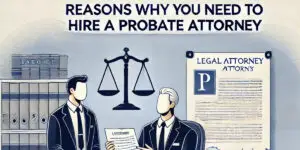Estate Planning Will Trust Attorney
A Will is an archive that rundowns how your assets will be disseminated after you pass on. This makes the most common way of setting things significantly more straightforward for relatives and guarantees that your things go to the ideal locations.
You can choose who you might want to complete your desires, regardless of whether that is a relative or another person.
Also, a will is a place where guardians can choose a guardian for their kids if they die. Assuming there’s no determination, the court could manage the child framework with the family choices.
A trust contrasts with a will in that it becomes powerful when you set it set up while you’re as yet alive. A “living trust” deals with your property while alive and forestalls the more significant part of the lawful pressure if you become weakened.
They are assuming that you go into a state of unconscious, such as steps that would be set up to pass your things into the consideration of your picked beneficiary. That way, there’s no requirement for your friends and family to go to court to build up their stake in the things you own.
One more advantage of a trust is that your undertakings don’t get gone through the probate process. Will regularly lead to an individual’s things and issues being circulated in court as they’re thought over. Assuming you’re an individual who’s keen on keeping things hidden, a revocable trust can pass your stuff to friends and family without them expecting to go through the costly court processes.
Knowing what an estate plan provides and wanting help, you should call the number below. Today is the best time to make an estate plan for complete protection. For any questions about the following, ask morganlegalny.com or call (212) 561 – 4299 to get your financial freedom.
FAQ
1. What is Medicaid fraud?
Medicaid fraud is simply false information to get Medicaid to pay for all the services needed for yourself or someone else.
2. How much does a will cost in NY?
A usual Will can cost you about $1200, but with an estate plan package, it’ll be around the same price range or even less with a good estate lawyer. Then that can be much cheaper, up to $300 to $1000, depending on your situation.
3. When someone dies, does their debt go away?
No, when someone dies, if that person has any debt, creditors will still ask for the money back, adding more credit to the accounts. After the designation of the person’s assets during court, the payment of debts will also be announced to whoever the court calls responsible. So a family member, spouse, or close friend will continue paying everything you owe, which is why you should make an estate plan to prevent this sort of conflict.
4. Does a trust protect assets from a nursing home?
Yes, as long as you transfer funds towards your rent, mortgage, or assistant living instead of going to a nursing home.
5. Can I make an estate plan alone?
You are allowed to make your estate plan, but this would have you leave any significant amount of errors if an actual lawyer doesn’t view it. So, making your estate plan might be invalid if not looked over.
6. What does an elder care attorney do?
An elder care attorney has the expertise in arranging any necessary goals for whoever the elder being served needs. It can go along with not just estate planning but also medical care proxies, elder abuse, or dealing with ownership of spousal belongings. This is all regards to any senior over the age of 50.
7. What is a Totten Trust Form?
This trust form allows you to avoid probate due to already assigning a beneficiary after your name.
8. How do I know if my NY approved my unemployment claim?
After applying for unemployment at ny.gov, you should receive a letter towards your home address two weeks after applying. The letter states how much unemployment you should receive. If NY did not approve your case, you would receive the same letter in the same amount of time. The letter is saying you’re ineligible for benefits.
9. Do you need a lawyer for advance directives?
You can create these forms yourself if you are over 18, but they have the same disadvantages as handwriting your Will. This means that advance directives shouldn’t be handwritten to prevent future fallacies due to the inability to read the file or put information that has nothing to do with what’s needed. So you can make your advance directives, but as a recommendation, get a lawyer to guide you.
10. Does a trust override a will?
No, a trust has different functions than a Will. However, faith secures the Wills’s needs for whatever is on the list.









